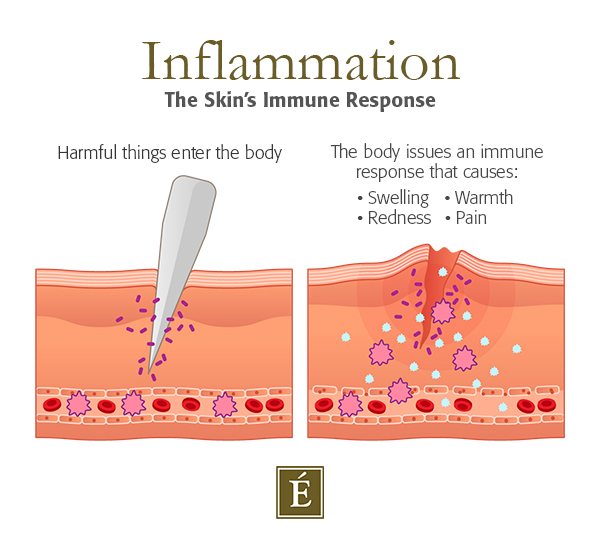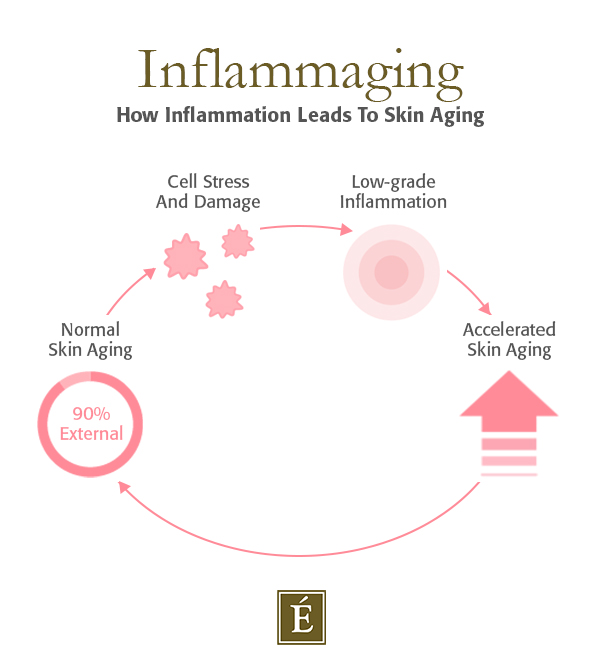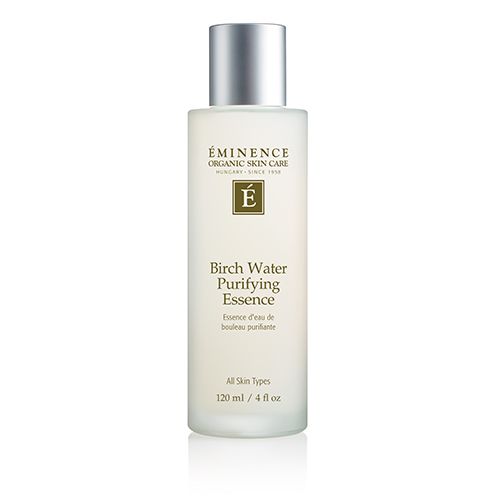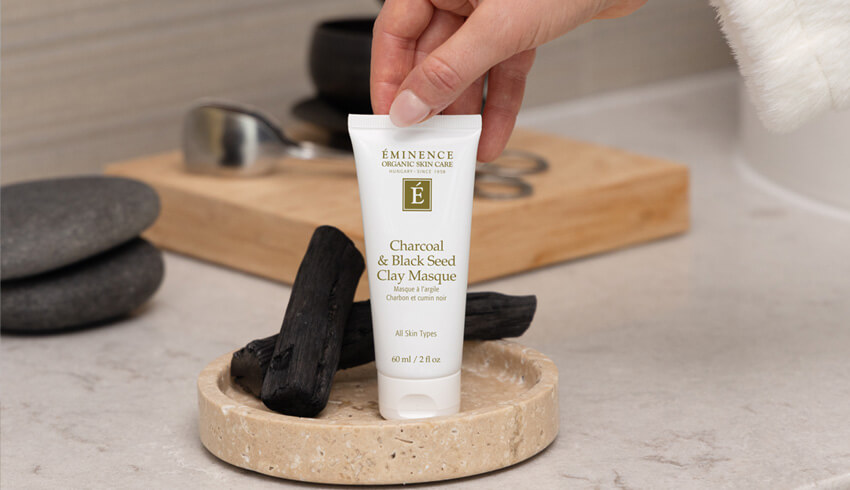.jpg?q=100)
It’s no secret that stress shows on your skin. From forehead lines to breakouts, stress has a way of showing its wear and tear on your face. But, did you know that it can also lead to premature aging? Internal and external stressors can set off a cycle of inflammation that accelerates the aging process. Read on for our guide to inflammaging and how to minimize its effects.
Two Types of Inflammation
Inflammation is a defense mechanism. It serves as the body’s natural way of protecting itself against injury and infection. However, when it occurs on a loop, it can cause damage that stresses your skin cells and accelerates the aging process.
Acute
There are two types of inflammation that affect skin health: acute and chronic. Acute inflammation is your body’s immediate response to negative stimuli. It typically has a rapid onset and lasts a few days before normalizing.
As an example, think of how your body responds to a bump on the knee. You feel immediate pain and over the next few hours may experience swelling, warmth and redness as your body sends fluid and white blood cells to the area. After several days, these symptoms minimize, and it’s like your injury never happened.

Chronic
Chronic inflammation, on the other hand, doesn’t quit. Environmental stressors and unhealthy lifestyle habits are to blame for this type of inflammatory response. In such cases, negative stimuli linger and set off an unhealthy cycle of inflammation that goes largely undetected.
Take pollution as an example. When you are exposed to pollution on a daily basis, your skin doesn’t have an opportunity to fully repair and heal itself; as a result, it exists in a constant state of mild inflammation. Eminence Organics Product Development Team describes how this occurs:
“Modern (often urban) living means we are often inundated by stress - whether that’s UV damage, pollution, lack of sleep or poor diet choices. Inflammation is our body’s natural defense mechanism to combat the effects of these stressors. As we age, our body becomes less efficient at ‘turning off’ the inflammatory response and the body goes into a chronic low-grade inflammatory status that damages tissue.”
What Is Inflammaging & How Does It Happen?
Another name for this process is inflammaging. In short: Inflammation + aging = inflammaging. Here’s how our Product Development Team breaks it down:
“Inflammaging is a term used to describe aging induced by chronic, persistent, underlying inflammation that ultimately exhausts the skin’s defense system. This weakens skin structure, results in the degradation of collagen and elastin and impairs the skin’s barrier function. One of the most impactful things one can do to slow the effects of aging is to find ways to get off the hamster wheel of inflammaging.”

How does this happen? External stressors such as pollution, chemicals, artificial fragrances and even weather changes initiate a key enzyme in the skin called COX-2. You can think of this enzyme as an alarm system - it identifies a threat and initiates an inflammatory response.
Usually, the threat subsides and the alarm shuts off. However, if the threat is persistent, the alarm is triggered over and over until eventually it just stays on. This leaves the skin in a constant state of low-grade inflammation that continues to damage skin cells.
The Effects of Inflammaging
Inflammaging causes a number of skin changes that accelerate the aging process.
Dehydration
Hyaluronic acid’s primary function is to capture and retain water to keep your tissues well-lubricated. This powerful humectant can hold up to 1000 times its weight in water and is critical for keeping your skin healthy and hydrated.
As you age, your skin’s stores of hyaluronic acid naturally deplete (by up to 50 percent by age 40!). Chronic inflammation brought on by exposure to environmental stressors accelerates this process. It causes an increase in the enzyme hyaluronidase which breaks down hyaluronic acid even further.
Lacking sufficient water content, the skin becomes dry, dehydrated and inflexible. Inadequate hydration contributes to dullness, uneven skin tone and texture and the emergence of fine lines and wrinkles.
Collagen & Elastin Degradation
Chronic inflammation also damages your skin’s fibroblasts. These cells reside in the skin’s connective tissue and are responsible for producing collagen and elastin. Fibroblasts give skin its “tensity” and the ability to rebound from being depressed and folded (for example, by repeated facial expressions).
When inflammation becomes chronic, it sets off metalloproteinases (MMPs) in the skin. These enzymes which are found in the spaces between skin cells break down proteins such as collagen and elastin and inhibit their production.
When MMPs are triggered over and over, they degrade the skin’s structural proteins at a rapid rate. At such a speed, it’s difficult for your skin’s fibroblasts to keep up. Because collagen and elastin are broken down more quickly than they are repaired and replaced, your skin loses firmness and elasticity.
Glycation
Your skin gets its shape and volume from fat cells. When you’re young, these cells are plentiful (think chubby baby cheeks) but over time, they naturally deplete. As your skin loses its ability to build and retain fat, it becomes less and less plump.
Inflammaging exacerbates this by triggering glycation. Through this process, the sugar in your bloodstream gloms onto fats and proteins and produces harmful free radicals called advanced glycation end products (AGEs). As AGEs accumulate, they damage the cells around them and cause your skin to, well, age.
When glycation attacks your fat cells, it causes them to become misshapen. As your face loses volume it can begin to appear flat and sunken, as though it is falling. The high, plump cheeks typical of a youthful complexion eventually give way to a more bottom-heavy face shape.
How To Minimize the Look of Inflammaging
What can we do about inflammaging? As well as making healthy lifestyle changes (buh-bye cigarettes, alcohol and sugary treats), you can apply topical skin care to improve the appearance of damage. Here’s our advice for preventing and reducing the visible signs of inflammaging.
Minimize Triggers
The first step in tackling inflammaging is to minimize its triggers. One of the best ways to do this is with a skin detox that clears inflammation-causing impurities and environmental irritants. Eminence Organics Product Support Team Lead Alicia Hawthorne explains the benefits:
“Detoxifying the skin allows the skin a fresh start. Detox stimulates a healthier environment for the skin and can encourage increased production of collagen and elastin. These changes can help increase cell turnover and improve the skin barrier overall.”

You can calm the look of inflammation by staying hydrated, eating a diet rich in healthy fats and fresh produce and using skin care that contains purifying ingredients. Our Birch Water Purifying Essence contains birch water, a powerhouse sap that is packed with electrolytes, flavonoids, amino acids, proteins, enzymes and vitamins. Eminence Organics Lead Skin Care Trainer Natalie Pergar calls birch water “nature’s sports drink” for its ability to replenish the skin and optimize its health.
Protect Collagen & Elastin
Collagen and elastin play an essential role in keeping your skin plump, elastic and youthful. However, they take a beating when faced with inflammaging. Enter, adaptogens. These mushrooms, plants and roots help the body (and skin) adapt to changes in its emotional and physical state. Rich in antioxidants, they help minimize inflammation and neutralize free radicals that attack collagen and elastin.
One of the most powerful adaptogens is the reishi mushroom. Known as the “mushroom of immortality,” this mushroom’s superpowers come from its more than 400 bio-active compounds. As Rachel Gargiulo, certified nutrition consultant, tells Well+Good: “Reishi mushrooms are great for stimulating the immune system and liver function, producing an anti-inflammatory effect on the body.”
You can add reishi to your skin care routine with the Pure Forest Collection. Inspired by the healing power of the forest, each product in this collection includes adaptogenic reishi mushroom to protect the skin from the visible effects of inflammaging.
Fortify & Repair Your Skin Barrier
You can counter the dehydrating effects of inflammaging with botanicals that protect the skin’s hydration and moisture content. Another adaptogen, snow mushroom, rivals hyaluronic acid in its ability to rehydrate and moisturize the skin.
Also known as a “super-humectant,” this gelatinous mushroom contains high levels of polysaccharides which help it draw moisture deep into the skin. It holds up to 500 times its weight in water, but its small particles can penetrate the skin more deeply than hyaluronic acid, enabling it to provide even more potent hydration.
Here's a closer look at snow mushroom's incredible abilities:
This deeply hydrating ingredient can also be found in the Birch Water Purifying Essence, Snow Mushroom & Reishi Masque and Snow Mushroom Moisture Cloud Eye Cream. Together, these products help rehydrate skin that has lost water and moisture through inflammaging.
Are you ready to put a stop to inflammaging? Experience the Pure Forest Collection at an Eminence Organics Spa Partner near you.


